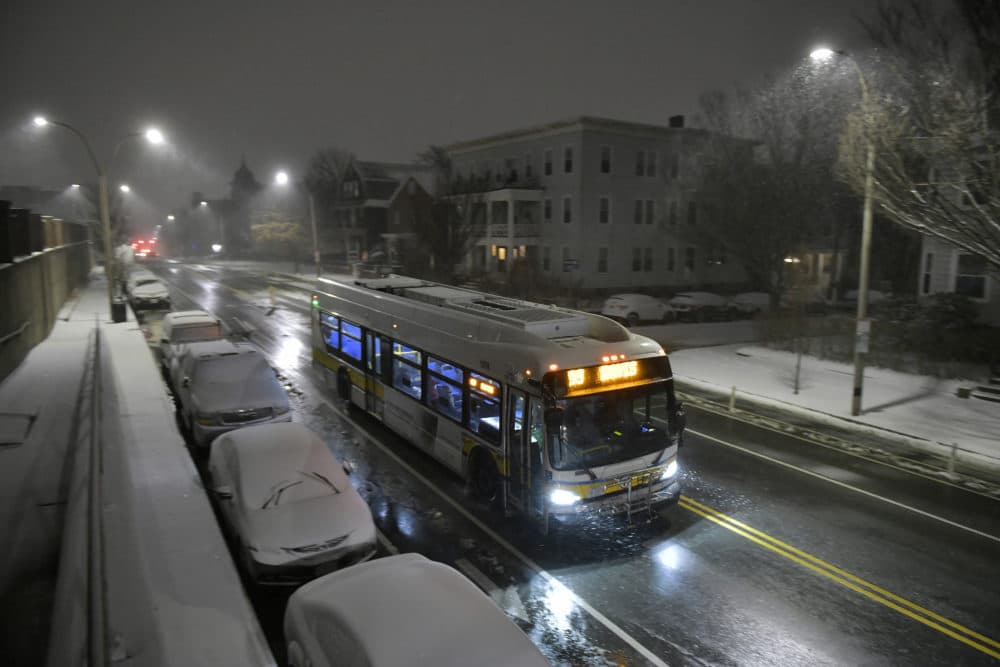Advertisement
MBTA embraces diesel-electric buses on way to full electric future

MBTA overseers on Thursday approved a $157 million purchase of 160 diesel-electric hybrid buses, embracing the vehicles as a step along the way toward full electrification while irking transit advocates who want the agency to move away from any fossil fuel footprint.
One month before the T is set to kick off procurement of more than 400 battery electric buses, the MBTA Board of Directors voted 6-0 in favor of a contract with New Flyer of America to add dozens of 40-foot hybrid buses.
The transit agency is working toward a goal of a fully electric fleet — featuring net-zero carbon emissions — by 2040, but MBTA officials say they first need to build out substantial new infrastructure to support that goal.
"While the immediate procurement for you is considered the latest technology, it is a bridging technology for our planned all-battery electric bus fleet," MBTA Director of Vehicle Engineering William Wolfgang told the T's board on Thursday.
Wolfgang said although the hybrid buses will still produce some greenhouse gas emissions, they will replace the oldest all-diesel vehicles in the fleet, leading to a net emissions decrease in the short term while work continues to convert or construct maintenance facilities that can handle fully electric vehicles.
Scott Hamwey, the T's director of bus modernization, estimated that the oldest diesel buses release 15 to 20 percent more greenhouse emissions than the newest available hybrids.
Still, some transit and environmental advocates are frustrated that the T is investing new resources in vehicles that continue to spew emissions, which they warn create disproportionately negative health impacts on environmental justice communities.
"It is disappointing that the T is going ahead with the purchase of 160 diesel hybrid buses," Veena Dharmaraj, director of transportation for the Massachusetts Sierra Club, told the T's board at the start of Thursday's meeting. "To meet our climate goals and improve public health outcomes, I urge the T to limit and phase out the procurement of diesel hybrids by 2023."
The T will alternate between purchases of hybrid and battery electric buses, aiming to replace between 80 and 100 every year to convert the fleet of roughly 1,100 vehicles. Officials expect 2027 will be the last year in which the T needs to buy hybrid vehicles.
Advertisement
A request for proposals for procuring more than 400 battery electric buses should be released on April 22, Wolfgang said, with the contract award planned for later in the fall.
Statewide, the transportation sector accounts for roughly 42 percent of all greenhouse gas emissions, making it a key target for transformation as Massachusetts works to become net-zero by 2050 as outlined in a climate law approved last year.
The T's now-dissolved Fiscal and Management Control Board in 2019 called for embarking on a long-term project to electrify the entire commuter rail system, though progress on that front has been slower than efforts to electrify buses.
"Without network-wide electrification, not only will the previously mentioned priorities not be achieved, but the commonwealth will not be able to reach its decarbonization goals," said Juanita Gibson, a staff attorney at the Conservation Law Foundation.
MBTA officials have their sights set on a fully green bus fleet, but they say the transition will take time because the network is not yet positioned to support the unique needs of electric vehicles. Only one of the T's nine maintenance facilities is currently able to house an all-electric fleet, Hamwey said, and only about 3 percent of MBTA buses are electric.
The T expects to finish retrofitting the North Cambridge garage to handle electric buses in 2023, then wrap up construction on a brand-new Quincy garage in 2024. That Quincy facility, for which officials broke ground last month, will replace an existing century-old garage and will have capacity for 120 battery electric buses.
In a presentation delivered Thursday, Hamwey said the MBTA aims to have about 30 percent of its buses be electric vehicles in 2027, more than 50 percent of the fleet electrified in 2030, and complete bus electrification by 2040.
State lawmakers may opt to order a faster pace on that transition. Telecommunications, Utilities and Energy Committee Co-chair Sen. Michael Barrett said this month that his chamber's forthcoming climate legislation will make another pass at enshrining in state law a target date for T bus electrification.
"I don't think the Legislature is going to wait 15 to 18 years to green the T fleet because we can't get to our emissions goals, we can't get 50 percent below 1990 levels in total statewide emissions, if we operate on those kinds of timeframes. It just doesn't compute," Barrett said. "I can appreciate the complexity here, but that is not going to work."